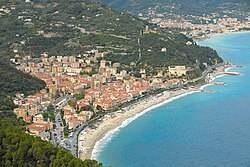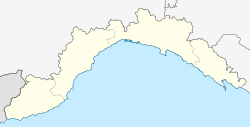Noli
 From Wikipedia - Reading time: 8 min
From Wikipedia - Reading time: 8 min
Noli
Nöi (Ligurian) | |
|---|---|
| Comune di Noli | |
 | |
| Coordinates: 44°12′22″N 8°24′48″E / 44.20611°N 8.41333°E[1] | |
| Country | Italy |
| Region | Liguria |
| Province | Savona (SV) |
| Frazioni | Tosse, Voze |
| Area | |
• Total | 9.623 km2 (3.715 sq mi) |
| Elevation | 2 m (7 ft) |
| Population (31 December 2010)[3] | |
• Total | 2,861 |
| • Density | 300/km2 (770/sq mi) |
| Demonym | Nolesi |
| Time zone | UTC+1 (CET) |
| • Summer (DST) | UTC+2 (CEST) |
| Postal code | 17026 |
| Dialing code | 019 |
| Patron saint | Eugenius of Carthage |
| Saint day | Second Sunday of July |
| Website | Official website |

Noli (Italian: [ˈnɔːli]; Ligurian: Nöi [ˈnɔːi]) is a coast comune of Liguria, Italy, in the Province of Savona, it is about 50 kilometres (31 mi) southwest of Genoa by rail, about 4 metres (13 ft) above sea-level. The origin of the name may come from Neapolis, meaning "new city" in Greek.
It is one of I Borghi più belli d'Italia ("The most beautiful villages of Italy").[4] From 1192 to 1797 Noli was one of the maritime republics, the Republic of Noli.
Geography
[edit]The bounding communes of Noli are Finale Ligure, Spotorno and Vezzi Portio.
History
[edit]The name Noli, testified in the form Naboli in the oldest documents (between 1004 and 1005), certainly derives from a form of Neapolis which means "new city" in Byzantine Greek (same etymology as for Naples).
It may be mentioned as Neapolis by 7th century geographer George of Cyprus.[5]
The Republic of Noli was an independent republic from 1193 until 1797. In 1239 it became seat of a bishop; later on the diocese was united with that of Savona as the Diocese of Savona-Noli. The Napoleonic invasion in 1797 put an end to Noli's sovereignty.
Main sights
[edit]- Romanesque basilica of S. Paragorio (11th century)
- Household and annexed Tower (14th-15th century)
- San Paragorio (5th–6th century)
- Tower and Gate Papone (13th-14th centuries)
- Tower of Four Sides.
- Nemo's Garden (Noli)
-
Cathedral tower, castle and Torre del Comune.
-
Romanesque wooden Christ inside San Paragorio.
-
Noli and Spotorno viewed from Capo Noli.
Twin towns — sister cities
[edit]Noli is twinned with:
 Langenargen, Germany (2005)
Langenargen, Germany (2005)
Personalities
[edit]- António de Noli, Italian nobleman and explorer, discoverer of some Guinea territories and Cape Verde islands on behalf of the Portuguese crown.[6] Born in Genoa 1419, "family with origins in Noli or the Castle of Noli".[7]
References
[edit]- This article incorporates text from a publication now in the public domain: Chisholm, Hugh, ed. (1911). "Noli". Encyclopædia Britannica. Vol. 19 (11th ed.). Cambridge University Press. p. 734.
- ^ "The World Gazetteer". Archived from the original on 9 February 2013. Retrieved 2007-02-20.
- ^ "Superficie di Comuni Province e Regioni italiane al 9 ottobre 2011". Italian National Institute of Statistics. Retrieved 16 March 2019.
- ^ Population from Istat
- ^ "Liguria" (in Italian). Retrieved 31 July 2023.
- ^ Balzaretti, Ross (2013). Dark Age Liguria: regional identity and local power c. 400-1020. Studies in early medieval history. London: Bloomsbury. pp. 49–50. ISBN 978-1-78093-030-5.
- ^ Joao de Barros wrote on the Italian navigator: "Di natione genovese, et di sangue nobile, che per alcuni dispiaceri che hebbe nella patria sua se ne venne in questo regno con due navi”. Barros, João. "L’Asia", Dec. I. lib. 2. cap. I. Republished by Vincenzo Valgrisio, Venice, 1562
- ^ According to Della Cella manuscripts "Perittissimo piloto Genovese"; on the family "l’origine si puo supponere dalla piccola Città o Castello di Noli”. Della Cella, "Famiglie Di Genova. Antiche, e moderne, estinte, e viventi, nobili, e populari". Parte II, D.E.F.G.I.L.M.N.O./ MDCCLXXXIII. Page 293
External links
[edit]![]() Media related to Noli at Wikimedia Commons
Media related to Noli at Wikimedia Commons
- (in Italian) Photographs of Noli
 KSF
KSF






